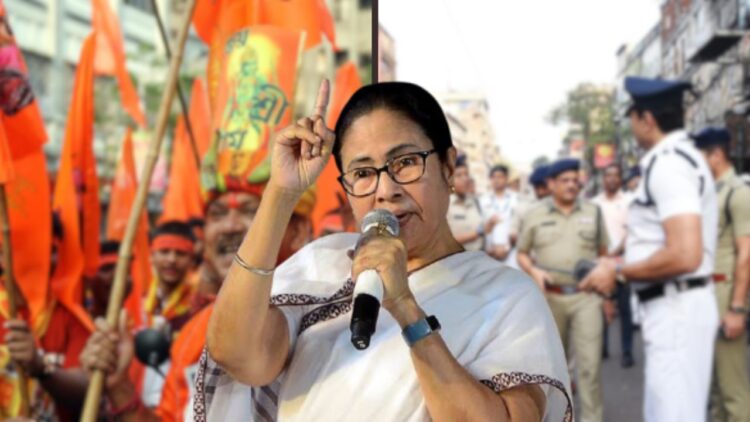While the rest of India celebrated Ram Navami with spiritual fervour, vibrant processions, and devotional songs echoing through the streets, a disturbing pattern has been reported in West Bengal — a state where being a proud Hindu is increasingly becoming a liability under the Mamata Banerjee regime.
Once known as the land of cultural confluence and religious harmony, Bengal today stands as a cautionary tale. The state’s ruling Trinamool Congress (TMC), led by Mamata Banerjee, has repeatedly bent over backwards to appease its Muslim vote bank, systematically marginalising Hindus in the process. In the latest a fresh set of stifling and discriminatory restrictions imposed on Ram Navami celebrations.
Mamata’s Blueprint: Appease the Vote Bank, Muzzle the Majority
In Bengal, the state machinery doesn’t work for law and order anymore — it works for vote bank arithmetic. And nothing exposes this more clearly than the state’s treatment of Hindu festivals. Ram Navami, a sacred celebration that honours the birth of Lord Ram, is being turned into a tightly policed, restricted event under the guise of “maintaining peace.”
This year too, the Mamata government has enforced humiliating restrictions on Ram Navami processions — no more than 200 participants, a complete ban on carrying even symbolic weapons (like lathis hoisting saffron flags), no slogans, no devotional songs, no loudspeakers, and most importantly, no processions allowed through areas with Muslim population or mosques. Essentially, Hindus are being told: celebrate quietly, or don’t celebrate at all.
Worse still, all routes for the processions are pre-decided by the police — Hindu organisations have no say in it. If anything “goes wrong,” organisers are threatened with legal action. The message is loud and clear: if you’re a Hindu in Bengal, you’re under surveillance.
From Cultural Pride to Censorship
This incident is not a one-off event. Over the past 14 years of Mamata Banerjee’s rule, there has been a systematic attempt to suppress Hindu identity while emboldening radical Muslim elements. Celebrations like Durga Puja and Saraswati Puja have also faced similar hurdles — idol immersions being delayed or denied, loud music being banned, and routes changed at the last moment — all to avoid “hurting sentiments” of Mamata Banerjee’s vote bank.
In reality, it’s not about maintaining harmony anymore. It’s about enforcing subjugation.
What’s worse is that these restrictions are not preventive — they are punitive. They don’t stop violence; they reward it. In Malda’s Mothabari, just days ago, a peaceful Ram Navami procession faced violent backlash from radicalised Muslim mobs merely because it passed by a mosque and played bhajans. The result? Hindu homes and businesses were attacked, vandalised, and looted the next day. And what did the Mamata government do?
Instead of cracking down on the attackers, they tightened restrictions on future Hindu processions. Victims were punished. Perpetrators went scot-free.
A Pattern of Appeasement and Cowardice
From Malda to Murshidabad, from Howrah to Asansol, the same story repeats: Hindu processions face resistance, Hindus are blamed, and Muslims are shielded. Radical clerics emboldened by state patronage now demand that Hindu rituals like blowing conch shells, ringing bells, or singing kirtans be curtailed if they “disturb” Muslims.
Why this growing intolerance? Because Mamata Banerjee’s brand of politics thrives on appeasement. The unchecked influx of Bangladeshi Muslims over the decades — actively enabled by successive governments, including hers — has completely altered the demography of large parts of Bengal. And with that, the assertiveness of radical elements has grown. The message is clear: Hindus must either comply with the new rules or face violence, arrest, and displacement.
Even in Hindu-majority areas, if Muslims are present in significant numbers, they dictate terms. This is not coexistence — this is coercion.
Where Is the Rule of Law?
Bengal’s police force, once proud and professional, has now been reduced to Mamata’s personal vote-bank enforcers. After every communal flare-up, they arrest Hindus for “provocation” rather than going after the violent mobs. Justice has been replaced with political calculations. The radical elements know this, which is why they act with impunity.
According to BJP leaders and VHP organisers, the state is now completely biased. Hindus are being punished for merely wanting to celebrate their festivals. Meanwhile, radicalised elements receive a free pass, protected by both political will and administrative inaction.
The Silent Exodus
Hindus, especially in rural and border areas, are silently moving out. Demographic changes, targeted harassment, economic pressure, and fear of violence are pushing families out of their ancestral homes. Many are leaving for cities or even other states, leaving behind a vulnerable elderly generation who are too weak to resist the growing pressure from Muslim mobs.
Even educated, urban Hindus are feeling the heat. The fear is no longer hidden — it’s open, vocal, and increasing.
Radicalisation: The Dangerous Shift
Sociologists and retired officials confirm a growing radicalisation among Bengali Muslims, primarily due to the influence of Salafi Islam spread via madrassas and clerics supported by foreign funding. These institutions openly preach intolerance towards Hindu practices, labelling even the sound of temple bells or shankh as “haram.”
What was once a culturally rich and syncretic community has now become increasingly intolerant — not due to religion alone, but because of political patronage that rewards regressive ideology over peaceful coexistence.
Final Words: Bengal’s Future at Crossroads
West Bengal today stands at a dangerous crossroads. Under Mamata Banerjee’s regime, Hindu festivals are under siege, Hindu sentiments are constantly trampled, and Hindu safety is in jeopardy. The path the state has taken — of appeasement, cowardice, and demographic manipulation — is not just unsustainable, it is dangerous.
If this trend continues, the very fabric of Bengal — where once Ramakrishna, Vivekananda, and Tagore stood tall — will be torn beyond repair.

















Comments